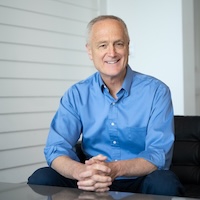Last Thursday, Lakelight convened a panel of experts to discuss one of the most consequential developments of our time: artificial intelligence. They explored not just what AI can do, but what it should do — and how people of faith and conviction can lead that conversation.
Here are nine major takeaways:
1. AI Is a Powerful Tool—but Still a Tool (Not A Person)
Artificial intelligence is not a person.
It doesn’t feel, think, or decide in the way humans do. AI systems process inputs and generate outputs based on algorithms fueled by data and power. That doesn’t make them conscious; it makes them useful.
At its best, “AI is here to remove complexity,” said Mike Conley, a Senior Advisor to BlueVoyant, a global leader in cybersecurity. Used well, AI can automate tedious work and help humans focus on what truly matters. Especially for entrepreneurs launching new businesses, AI can take what once took 6 months – building the back-end systems, programming and operational infrastructure – and churn it out within days. Nevertheless, AI is not sentient; it is not made in the image of God; it must remain in the proper place: under human authority, not above it.
2. The Engine Behind AI: Data and Power
Why exactly did AI emerge today?
In fact, AI has existed in some form for decades, but recent advances stem from a convergence of massive datasets and extraordinary computing power. In a math formula, "AI = Algorithm + Data + Power.” With the internet providing data upon data and the proliferation of data centers (power), AI algorithms – which had existed since the 1970s – had enough juice to produce better and better outputs.
The process is fueled by chips powerful enough to support deep learning at scale, enabling breakthroughs not because the math changed, but because the machine finally caught up. AI is not a wild step forward in the evolution of consciousness — at least, not yet — rather, it’s a development in engineering.
3. Healthcare Shows the Promise—and Risk—of AI
From detecting orphan diseases to generating personalized treatment plans, AI is revolutionizing healthcare. Bioethicist Matthew Eppinette summarized “AI can digest all your data at a super high speed and then spit out what might be going wrong with your body.”
But this same power raises challenging questions. Who owns that data? What if it’s misused? And what role should doctors play when AI can suggest treatments faster than a human ever could? AI can be a tremendous force for healing, but only if paired with safeguards that protect human dignity and privacy.
4. Education is Changing—Fast
In schools and universities, AI is both a threat and an opportunity.
A professor of entrepreneurship and humanities at Lake Forest College, Dr. Davis Schneiderman, emphasized AI’s value in grading: “sometimes I get tired of circling commas on student papers. Now I can let the bot catch them so I can focus on the student’s thinking.” But he also said, what most of us already knew, that students are using AI to cheat and write their papers.
Cheating aside, when used well, AI can enhance education through 24/7 tutoring, writing support, and personalized learning. Tools like ChatGPT can explain complex concepts at different reading levels – “Explain it to me like I’m in 10th grade” – but students and educators must learn to use these tools wisely, lest they become crutches rather than catalysts.
5. AI is Reshaping the Workforce
A real estate executive for KPC Advisors, William Adjei, described a project he recently worked on that, before AI, took 30 people and 120 days. Now, he completed it alone — in days. AI-generated summaries, action plans, and draft documents are streamlining every industry.
Adjei said bluntly, “It’s not AI that will take your job, it’s someone using AI that will.” That may now be evolving into, “it’s AI using AI that will take your job.” The implications for employment are massive. But the solution isn’t resistance.
In the words of his fellow panelist Mike Conley, “if you don’t like change, you’re going to hate extinction.”
6. Ethics Must Lead the Way
One of the evening’s most important themes: technology is not neutral. It amplifies the values of the people who design and use it.
Bioethicist Dr. Matthew Eppinette, said that most of his thinking is devoted to asking himself, “How do we make use of this information in ways that are wise? How can we use this data toward the ends of human flourishing?”
Without ethical frameworks, AI will default to efficiency over equity, power over responsibility. Data and information do not equal wisdom. That’s why theological and philosophical traditions must be at the table. We cannot outsource morality to machines.
7. We Must Reexamine What it Means to Be Human
Companies like Neuralink and the concept of “e-persons” are forcing us to ask: what is a human? All the panelists agreed that the boundary between human and transhuman is “about to get much fuzzier.” While science fiction has long predicted such debates, they are no longer fiction.
Theologically, this challenges Christians to revisit doctrines of embodiment, agency, and the image of God. Culturally, it pushes us to distinguish between augmentation and replacement — between a world enhanced by tools and one ruled by them.
8. Disruption is Coming—But So is Opportunity
To repeat Conley’s refrain, “if you don’t like change, you’re going to hate extinction.”
AI will disrupt jobs, institutions, and even identities. But this isn’t the first time humanity has navigated technological upheaval. From the printing press to the internet, we’ve faced this before. The challenge is not to stop change, but to shape it through “re-learning, re-tooling, re-skilling.”
9. Faith Still Grounds the Future
Pastor Mike Woodruff closed the night by reminding us, with a wry smile, that “God is not worried about his AI strategy plan.”
Christian theology affirms that history is not random and humanity is not an accident. In the face of accelerating change, we are invited to respond not with panic but with purpose. With trust. With wisdom. The challenge isn’t to stop AI — it’s to steward it, so that it serves what is good, true, and beautiful.
Want to learn more? Watch the panel here.
(This article itself was written with the help of our advisor, Mr. ChatGPT :))
Lakelight Monthly
Curated resources, delivered on the last Saturday of the month.
By subscribing you agree to with our Privacy Policy and provide consent to receive updates from our company.















